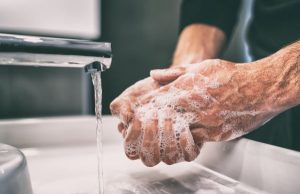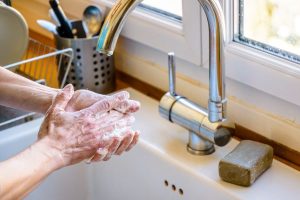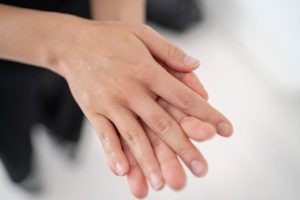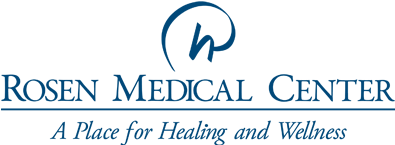By John Nassivera
In consultation with Dr. Ronald Ryan, MD CPE
Oct. 7, 2025
Our long-term health is all about the little actions we take each day, including washing our hands.
It sounds simple, but unfortunately, it’s easy to dismiss, and even forget. As we go about each day, we need to remember the possibility of the germs we can carry from everything we touch.
It doesn’t help just knowing that we need to wash our hands at the right time. Knowing how to keep our hands germ-free can make the difference between our body being a temple of health or a transporter of severe illnesses.

National Handwashing Awareness Week takes place this year from December 7 – 13. This is a great opportunity to develop better habits for our own sake and for those around us.
This guide aims to help you understand how to properly wash your hands and make it part of your daily routine so that you spread nothing but good health.
Key Takeaways
Why Washing Your Hands is Important
So what if you forgot to wash your hands before dinner. It’s not the end of the world, right?
Underestimating the importance of healthy habits can lead to problems for yourself and those around you. Handwashing is no exception.
We don’t realize how often we touch our eyes, noses, and mouths throughout the day. These are easy spots for germs to get into our body from the door handles, handrails, tabletops, and even toys we touch. They can also get into our foods and drinks when our meals are prepared with unwashed hands.
Unwashed hands are more harmful than you may realize. One of the common sources of Salmonella, E. coli 0157, and other germs is feces (poop) from people and animals. These germs can cause diarrhea and spread adenovirus, hand-foot-mouth disease, and other respiratory infections.
The Center for Disease Control and Prevention notes that about 1.8 million children under the age of 5 die from diarrheal diseases and pneumonia. These are the top two causes of death for children around the world.
Washing hands with soap can prevent 1 in 3 illnesses that cause diarrhea and 1 in 5 respiratory infections. With the right routine, these little habits can save lives.

How to Wash Your Hands
Practice makes perfect, and the first part of having a proper handwashing routine is knowing the right technique.
Before you grab a bottle of soap and cover your hands in suds, learn how to get the beneficial effects so that you don’t have to re-wash your hands.
First, wet your hands under clean, running water. While it doesn’t matter if it’s warm or cold water, we recommend cold since it leaves a more positive impact on the environment. (Warmer water may cause skin irritation.) Turn off the faucet after wetting your hands to save water.
The second step is to apply soap to your hands and rub them together for at least 20 seconds. Make sure to wash the front and back of each hand, your wrists, the spaces between your fingers, and under your fingernails. Time yourself by humming the “happy birthday” song twice to make sure you scrub for the full 20 seconds.
Next, turn the tap back on and rinse your hands under running water. Keep rinsing until all the soap is gone, because this will mean that all the germs will be gone, as well. Turn off your faucet with your elbow or a paper towel to keep new germs from getting onto your now-clean hands.
Finally, dry your hands with a clean hand towel or paper towel. Research has found that germs can spread easier on wet hands as opposed to dry ones, so don’t just shake your hands and let them dry. With a towel on hand, your hands stay cleaner for longer.

When to Wash Your Hands
It may sound time-consuming, but washing your hands throughout the day keeps you safe from germs waiting from everything we touch from sunrise to sunset.
Since our mouths are a common entry point for germs, we recommend washing your hands before eating any food. Remember to also do so before and after preparing food, as well as immediately after touching raw meat.
After wiping down areas in your kitchen, make a quick trip to the sink or the bathroom to keep your hands free of chemicals from cleaners. Washing your hands after touching garbage or compost is also a must.
Pet owners should wash their hands after touching their pets, cleaning spaces occupied by their furry friends, and handling pet foods or treats. Parents and caregivers should do so after changing diapers, helping someone clean up after using a toilet, and caring for anyone who is sick.
Don’t forget about all the body fluids carrying germs that can give us trouble. Whether you just sneezed, coughed, blew your nose, or used the bathroom, it’s time to wash your hands. That especially goes for after cleaning up vomit or diarrhea, as well as before and after cleaning up and bandaging a wound.
Are you looking for ways to keep your hands clean at work? Wash them after using equipment, computer keyboards, and other objects you share with staff. Doorknobs, elevator buttons, and railings also carry germs that require a visit to the nearest handwashing station. Keep your employer’s guidelines nearby so that you know what practices are required.
Anyone who wears contact lenses should wash their hands before putting them on to keep their eyes germ-free. When you get home from any public place or after spending time outdoors, wash your hands before relaxing on the couch to binge on your favorite show.
While the soap and water combination is the go-to for germ-free hands, hand sanitizer can do the trick if you don’t have access to the former. It can also help if you’re traveling and you and/or your kids want to keep their hands clean. If you’re stopping by a hospital or nursing home to see a loved one, use some hand sanitizer before and after your visit.
However, we advise using soap and water since it does a better job at getting rid of germs, pesticides, grease, dirt, and residue from everything you touch throughout the day.

Is Washing Your Hands Too Much a Problem?
You may be asking yourself after all these tips, “Is washing your hands too much a bad thing?” The answer is yes.
While a regular routine is key, washing your hands too much can remove the healthy oils and good bacteria that are necessary for fending off germs. Washing too much can also make your hands dry or cracked, which can give germs a new entry point.
We understand that you may need to wash your hands more often due to the equipment you may work with or the environment(s) you find yourself in often. In this case, moisturizers with emollients can keep your hands smooth and germ-free and your long-term health intact.

How to Spread Handwashing Awareness
Knowledge is power, and knowing how to keep your hands clean gives you more control over your own health. Such knowledge is even more powerful when provided to those around you.
Parents can set a good example for their kids by showing them the proper technique and making handwashing fun. Songs like “happy birthday” and the ABCs can help them follow the 20-second rule.
Positive reinforcement through rewards such as stickers and extra time to watch TV can help encourage kids to wash their hands. With colorful, foaming, and uniquely shaped soaps, handwashing can become much more fun for the little ones.
You can also spread handwashing awareness by talking to friends, coworkers, and family about how they go about keeping their skin germ-free. If loved ones have jobs that require frequent handwashing, you can inform them of helpful strategies and products.
Learning more yourself can help you become a reliable source of handwashing information. The next time you meet with your healthcare provider, ask them questions about anything you may be doing incorrectly or not at all in your handwashing routine.

Clean Hands for a Clean Life
Healthy habits save lives, no matter how small they may seem. With a regular handwashing routine, you give yourself and others a shield against troublesome germs.
The right technique and routine can help you avoid severe illnesses that can keep you from enjoying the finer things in life. By spreading awareness instead of germs, everyone around you can enjoy clean hands and a healthier future.
Stop by Rosen Medical Center today and chat with our team about how you can improve your handwashing practices and treat your health with the respect it deserves.


